 W
WAnimal-baiting is a blood sport where an animal is tormented or attacked by another animal, for the purpose of entertainment or gambling. This activity is illegal in most countries with varying levels of enforcement.
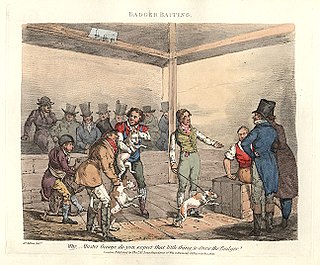 W
WBadger-baiting is a form of blood sport in which badgers are baited with dogs. A baiting session typically results in the death of the badger, and possibly serious injuries to the dogs.
 W
WA bear pit was historically used to display bears, typically for entertainment and especially bear-baiting. The pit area was normally surrounded by a high fence, above which the spectators would look down on the bears.
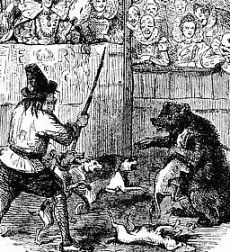 W
WBear-baiting is a blood sport involving the worrying or tormenting (baiting) of bears with dogs. It may also involve pitting a bear against another animal.
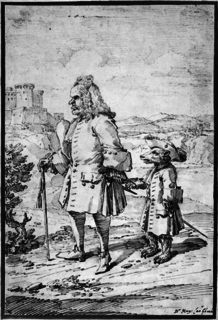 W
WA bear-leader was formerly a man who led bears about the country. In the Middle Ages and the Tudor period, these animals were chiefly used in the blood sport of bear-baiting and were led from village to village. Performing bears were also common; their keepers were generally Frenchmen or Italians.
 W
WThe Beargarden or Bear Pit was the facility for bear-baiting, bull-baiting, and other "animal sports" in the London area during the 16th and 17th centuries, from the Elizabethan era to the English Restoration period. Samuel Pepys visited the venue in 1666 and described it as "a rude and nasty pleasure". The last recorded event at the Beargarden was the baiting of "a fine but vicious horse" in 1682.
 W
WBull-baiting is a blood sport involving pitting a bull against another animal, usually a dog.
 W
WA cockfight is a blood sport between two cocks, or gamecocks, held in a ring called a cockpit. The history of raising fowl for fighting goes back 6,000 years. The first documented use of the word gamecock, denoting use of the cock as to a "game", a sport, pastime or entertainment, was recorded in 1634, after the term "cock of the game" used by George Wilson, in the earliest known book on the sport of cockfighting in The Commendation of Cocks and Cock Fighting in 1607. But it was during Magellan's voyage of discovery of the Philippines in 1521 when modern cockfighting was first witnessed and documented by Antonio Pigafetta, Magellan's chronicler, in the kingdom of Taytay.
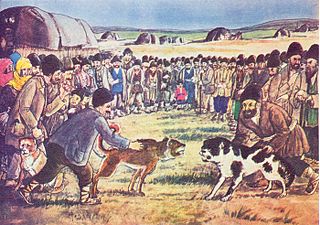 W
WDog fighting is a type of blood sport that turns game dogs against one another in a ring or a pit for the purposes of gambling or the entertainment of the spectators.
 W
WDog fighting in the United States is an activity in which fights between two game dogs are staged as a form of entertainment and gambling. Such activity has existed since the early 19th century in the United States and was gradually prohibited in all states. It continues as an underground activity in both rural and urban locations.
 W
WDonkey-baiting is a blood sport involving the baiting of donkeys.
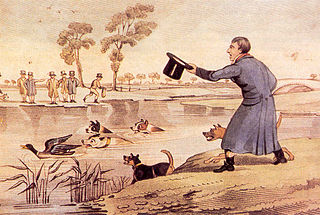 W
WDuck-baiting is a blood sport involving the baiting of ducks.
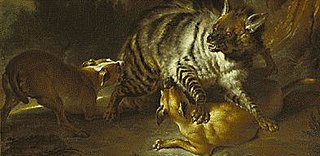 W
WHyena-baiting is a blood sport involving the baiting of hyenas.
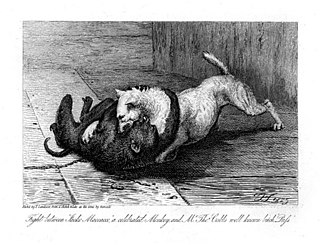 W
WJacco Macacco was a fighting ape or monkey who was exhibited in monkey-baiting matches at the Westminster Pit in London in the early 1820s. He achieved some measure of fame among the sporting community through his reputed prodigious record of victories against dogs, but was brought to wider attention by depiction in popular literature, artworks and by citation in speeches to Parliament by the animal welfare campaigner Richard Martin. Jacco's most famous fight, against the equally well-known bitch Puss, seems to have marked the end of his career: he may have died as a result of injuries received during the match or of an unrelated illness sometime afterwards. His ashes are housed at the True Crime Museum in Hastings, East Sussex.
 W
WLion-baiting is a blood sport involving the baiting of lions.
 W
WMonkey-baiting is a blood sport involving the baiting of monkeys.
 W
WThe Town Police Clauses Act 1847 is an Act of the Parliament of the United Kingdom. The statute remains in force and is frequently used by local councils to close roads to allow public events such as processions or street parties to take place. The Act is also used to regulate the local hackney carriage, taxi and private-hire trade in many areas. It deals with a range of street obstructions and nuisances, for example, it makes it illegal to perform certain actions in a public street or other thoroughfare, such as hanging washing, beating carpets, and flying kites. Historically, it was highly significant legislating against indecent exposure, indecent acts, obscene publications, and prostitution.
 W
WThe Westminster Pit was a well-known blood sport arena in nineteenth-century London, England. It reached a zenith of popularity between 1820 and 1830, and hosted such spectacles as dog-fighting, cock-fighting, bear-baiting, badger-baiting, monkey-baiting, and rat-baiting. A legal enterprise at the time, the Westminster Pit openly declared its activities, ushering notoriety on the district in which it existed.
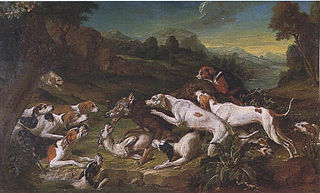 W
WWolf-baiting is a blood sport involving the baiting of wolves.